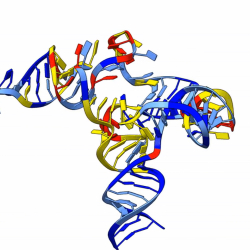From Ghana to Graduate School in Maryland
Chemistry Ph.D. student Solomon Attionu traveled thousands of miles from his home country in Africa to study the viral progression of hepatitis B and how to stop it.
Like many international students who live in the United States for the first time, Solomon Attionu experienced culture shock almost as soon as he landed in the U.S. He still clearly remembers the unfamiliarity he felt back in 2019 when he flew alone from Ghana to pursue a Ph.D. in Chemistry at the University of Maryland.

“Everything was a little off to me at that time,” Attionu recalled, listing a few reasons why he felt disoriented when he first arrived. “You guys don’t use the metric system. Your temperature isn’t measured in Celsius. You don’t write dates in the day, month and year format.”
Attionu, who is now in his fifth year, also joked that the most puzzling part of his new life in America was figuring out that even American light switches were different from Ghanaian ones.
“The light switches here are reversed,” he explained with a laugh. “To turn lights on, Ghanaians flick the switch in the opposite direction as Americans. It took me some time for that to click.”
But what immediately clicked for Attionu was his passion for chemical biology and his work with Chemistry and Biochemistry Professor Kwaku Dayie.
“The Dayie lab really helped me explore many ideas that I’ve never thought of before, especially at our group lunches and dinners. It’s a supportive environment that also gives me the freedom to branch out to new ways of thinking, both inside and out of the lab,” Attionu said. “My work with the team really affirmed my goal to research small molecules that inhibit the hepatitis B virus, to figure out the life cycle of viruses and ultimately inhibit their propagation.”
A home away from home
Dayie’s research lab—which calls itself a ‘door to the RNA world’—investigates the structure, function and dynamics of ribonucleic acids (RNA) to answer important questions about RNA’s multidimensional roles in cell biology. With recent advancements in genetic sequencing technology, RNA has become increasingly relevant to studies of processes that it previously hadn’t been linked to, such as gene regulation (controlling the timing, location and how much a gene is expressed) and catalysis (adding something that causes or speeds up a chemical reaction). The Dayie lab develops new technologies that examine RNA’s influence on virus replication.

For Attionu, the Dayie lab was the perfect place to pursue his interest in fighting hepatitis B, a virus that targets the liver and puts people at high risk of death from liver cancer or cirrhosis. Although hepatitis B can be prevented through vaccination, it remains a major global health problem in many parts of the world—including Ghana, Attionu’s home country.
“I remember reading that in 2019, the World Health Organization found that almost 300 million people live with a chronic form of hepatitis B, and that more than 800,000 people die from it per year worldwide,” Attionu said. “Ghana is considered a highly endemic country because of the high rates of hepatitis B among the general population.”
Attionu’s path to studying hepatitis B began when he was an undergraduate in chemistry at the University of Ghana. There, he worked to isolate and characterize medicinal compounds called triterpenoids from native Ghanaian plants for medical testing. Triterpenoids possess anti-inflammatory and antimicrobial properties, making them medically valuable.
“Working with these compounds was my first direct experience in dealing with something chemistry-related that could potentially help a lot of people,” Attionu described. “I knew then that taking this kind of hands-on approach and applying chemistry to living systems was something I wanted to do.”
As his interest in the medical applications of chemistry grew, Attionu looked for more opportunities to develop his knowledge base and skills in the lab. By chance, one of his chemistry professors at the University of Ghana, Patrick Arthur pointed toward a promising destination: UMD.
“My professor recommended that I join Kwaku’s lab, since that’s also where he completed his postdoc. He enjoyed his time there and all the experience he got,” Attionu said. “His stories about working under Kwaku helped me decide that this was where I wanted to be.”
After graduating with first class honors in chemistry at the University of Ghana, Attionu jumped onto a plane to the U.S. and has never looked back.
Since joining the Dayie team, Attionu has co-authored some papers on novel methods to screen for hepatitis B using RNA and potential RNA elements capable of regulating viral replication. He credits Dayie, his organic chemistry professor from Ghana and his former lab mates, Lukasz Olenginski and Mary Taiwo for the multidimensional directions his research has taken, far from what he imagined he would be studying when he first arrived in the States.
Attionu is now working on his dissertation on potential therapeutic targets for hepatitis B and hopes to defend it in 2024. Looking back at the last few years, Attionu feels that he has adjusted well to life in the U.S. and is excited for all the new opportunities that lie ahead.
“I still raise an eyebrow when someone calls football ‘soccer,’ but the U.S. feels much less foreign to me now,” he said. “I’m traveling around, exploring new places and experiencing much more than I ever have before. I hope that I can use what I’ve learned from both Ghana and Maryland to do my part as a chemist and really help people.”







